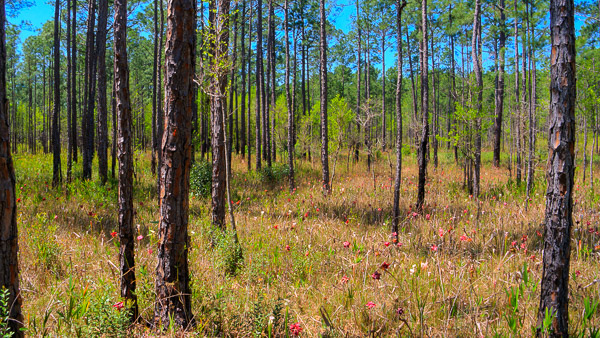Gulf Coast Carnivorous Plants
Richard Rathe March 10, 2025 (Photography, Travel)
Spring is the time to hunt for carnivorous plants along the Gulf Coast of Florida and Alabama. The image below from 2020 shows three different, unrelated species that have all evolved the ability to trap and consume insects (Pitcher Plants, Butterworts, and Sundews).

Wright Lake Area



The trails and campground are now open after being closed for several years due to hurricane damage. The campground was nicely kept, about half full, and reasonably quiet. I took the main trail along the river (Owl Creek) saw some interesting plants (Lupines) but no pitchers. I finally found Yellow Trumpet Pitcher Plants along the road to Hickory Landing (also a lot of Grass Pink Orchids). I couldn't find the path as I remember it from ten years ago. The trail blazes were no longer visible and I had to move on…

I drove slowly along the road near Sumatra, FL and I think I identified the burned area where I took the three carnivores
photo in 2020, however, it was much wetter so I could not stray far from the roadside.
I finally identified these beautiful flowering racemes that remind me of skyrockets going up. Stenanthium densum known as Osceola's Plume
or Crowpoison
(because they are actually very poisonous). The flowers bloom from the base upward. As they age they turn pink and finally maroon. This is a very nice visual effect!

I also found just a few Purple Pitcher Plants along the road. The flowers were in full bloom, with new pitcher-shaped leaves just emerging. The majority of the leaves looked old
, but this was likely due a hard freeze about two weeks prior to my visit.


Much harder to find the Parrot Pitcher Plants, which are smaller and tend to lie flat on the ground. You can see new leaves emerging just abobe the center of this photo.

Yellow River Marsh
Later that same day I reached Clear Creek and the Yellow River Marsh. The latter did not disappoint as you can see by the split image below.




This photo also shows three different carnivores in the mown verge of the highway… Petite Whitetop Pitcher Plants, Sundew Flower Stalks (Red Stems), & Threadleaf Sundews (backlit in the distance).

Splinter Hill Bog

This is the motherlode! The last time I visited it was a bit too early in the season. This year there was over an acre of mostly White Top Pitcher Plant Flowers!



The big surprise on my last trip was discovering cute little Iris flowers down in the pine litter. This year I walked a search pattern off the trail to see if I could find any, but saw none. 🙁 Then at the top of the hill I was deciding where to go next and happen to look down—and there was a blue gem at the edge of the trail.

These are Dwarf Woodland Irises. Based mostly on location I think these are Coastal Plain Dwarf Violet Iris (Iris verna var. verna). The flowers appear before the leaves emerge from the ground
and are commonly found growing in nutrient poor acid soils, in semi-shaded mesic to dry woodlands.

There were many ferns emerging, including the cinnamon stick
fronds with reproductive sporangia.

Then there was this blast from the past. When I was a child in biology class we had a sensitive plant
that would fold up when you touched it. I was enthralled. I flashed on that memory looking at this vine on the ground. I thought it can't be
, but sure enough a gentle stroke of my finger made the leaves fold in just a few seconds.


Tarkiln Bayou Preserve


In one area about fifty feet off the boardwalk I think I spotted a rare species… the Gulf Coast Red Pitcher Plant

The subspecies, Sarracenia rubra ssp. gulfensis, is endemic to Florida's Gulf Coast (meaning that the species occurs nowhere else).

The boardwalk terminates on the Bayou itself where an Osprey was calling overhead.

Photo Gallery
There are many more photos in the gallery…
(click any image to view or advance)
Summary Notes
- Florida Wright Lake (nice campground, pitchers were harder to find, lots of grass pink)
- Florida Clear Creek (so so, a bit late, overgrown, nice walk thru oaks)
- Florida Yellow River Marsh (very good, especially the roadside)
- Alabama Splinter Hill Bog (outstanding, more flowers than pitchers, woodland iris, no butterworts)
- Alabama Weeks Bay Pitcher Plant Bog (closed for repairs)
- Florida Tarkiln Bayou Preserve State Park (okay along boardwalk, many sundews, in future should walk the longer trail)
More Information
Native Pitcherplants of Florida
Carnivorous Plants — Novel Natives with Showy Flowers
Genetic Research Reveals Rich Diversity of Lupines in Florida


-sm.jpg)
-sm.jpg)
-sm.jpg)
-sm.jpg)
-sm.jpg)
-sm.jpg)

















-sm.jpg)











-sm.jpg)
















































































